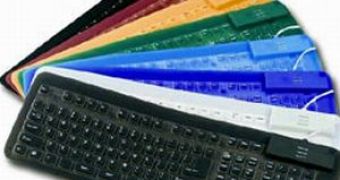Hospital team has developed a flat, coated in silicon keyboard to ward off bacteria and the spread of MRSA antibiotic-resistant superbug. The idea of designing the new bacteria-protective keyboard was 'triggered' by data of previous studies which showed that regular keyboards are to blame for a great part of MRSA infections. More exactly, investigations found that 25% of the common, plastic keyboards covers carry the bacteria-resistant staph and cause the death of a considerably high number of UK individuals due to the acquired infections.
The most important feature of the new-developed keyboard is the fact that it is coated in silicon, which makes it extremely easy for users to wipe it on a regular basis and keep off bacteria. Medical experts involved in the design and developing process of the particular silicon device pointed out that many common keyboards crawl with bacteria due to their plastic, hard to clean, cover. Moreover, the new keyboard is also provided with an automatic light which reminds users to clean it at regular intervals.
Describing the new keyboards, scientist Duncan Burton, who is in charge of Infection Control at the University College London, stated: "They're flat, they're very easy to clean with alcohol wipes, it makes it much quicker for nurses to clean them and nurses are responsible for cleaning keyboards in the clinical areas. So it's much more efficient to have a flat keyboard which is easy to clean and also has an automatic reminder light to remind staff to clean them."
The new keyboard which is going to ward off bacteria and will especially help in the killing of MRSA superbug, was developed by a team of researchers at the University College London Hospitals National Health Service (NHS) Trust. Taking into account the fact that 25% of the regular, plastic keyboards are responsible for the deaths of about 5000 UK individuals yearly, they set out to design a new, infection-protective keyboard. What they came up with is a flat, coated in silicon keyboard which is very efficient in keeping viruses and bacteria at distance.
The team stated that, according to tests, cleaning a keyboard twice a day cuts infection risks by 70%. Dr Peter Wilson of UCL Hospitals, the Consultant Microbiologist, who firstly thought about developing a bacteria-protective keyboard concluded:
"The numbers of keyboards are going to rise astronomically in the next few years. We're going for electronic patient records. That means that everything that used to be on the chart at the end of the bed will be now put into the keyboard. And so there is a risk that if transmission is occurring between patients via keyboards, this is going to be doubled, trebled, quadrupled in the near future."

 14 DAY TRIAL //
14 DAY TRIAL //